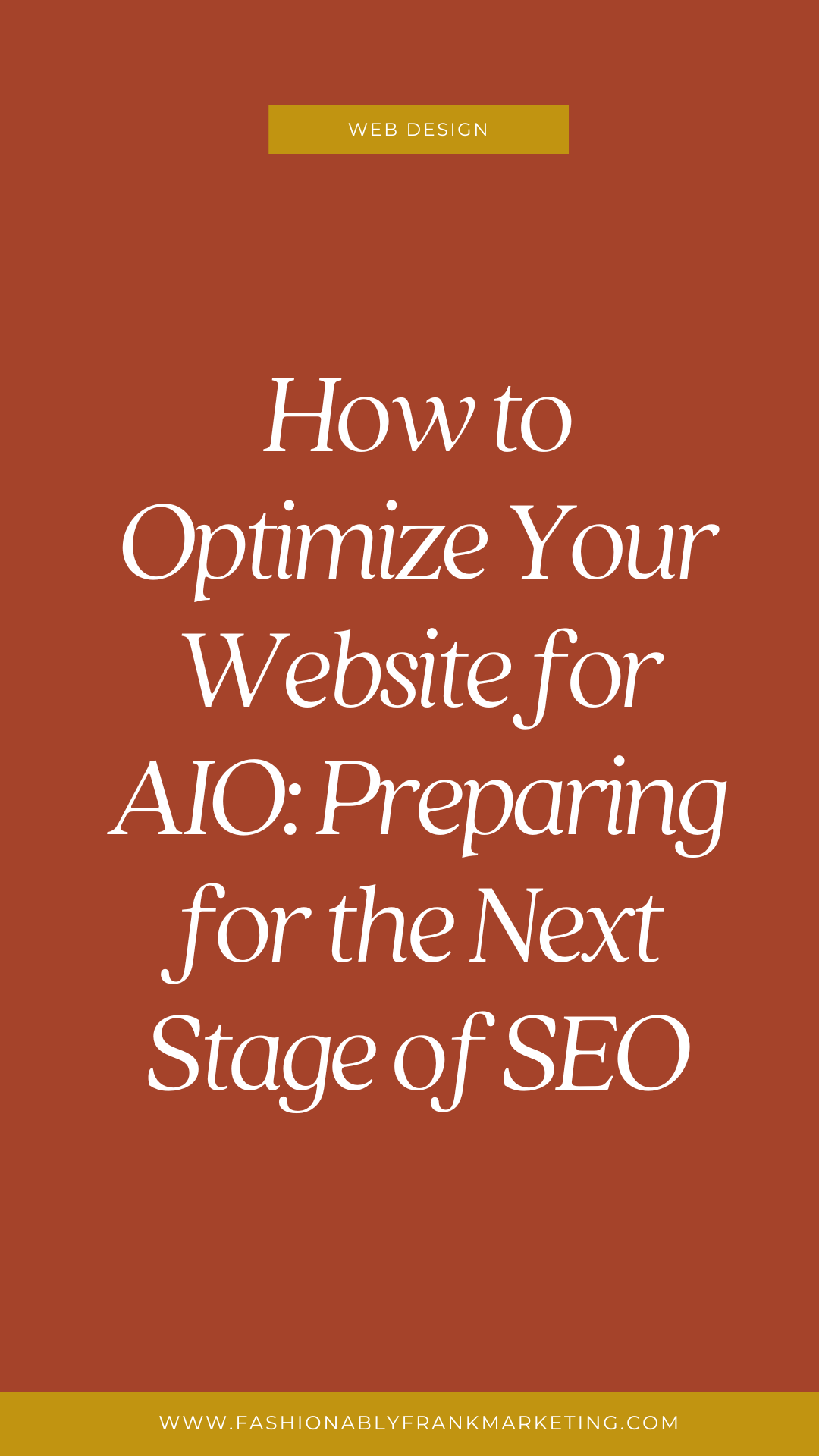How to Optimize Your Website for AIO: Preparing for the Next Stage of SEO
Search engine optimization (SEO) has always been about getting your website in front of the right people at the right time. But with the rise of artificial intelligence (AI) and answer engines like ChatGPT, Google’s Search Generative Experience (SGE), and Perplexity, the rules are changing. Enter Artificial Intelligence Optimization (AIO)—sometimes called Answer Engine Optimization (AEO)—the next stage of SEO that small business owners can’t afford to ignore.
How to Optimize Your Website for AIO
In this post, I’ll break down what AIO is, why it matters, and practical steps you can take today to prepare your website for the AI-driven search landscape!
What Is AIO (Artificial Intelligence Optimization)?
Traditionally, SEO has focused on ranking in search engines like Google by targeting keywords and building backlinks. But as AI tools grow in popularity, people are increasingly asking questions in conversational formats—and expecting direct, reliable answers.
Instead of scrolling through a list of 10 blue links, users might see one AI-generated answer pulled from multiple sources. That means your content has to be:
Structured clearly so AI can understand and summarize it.
Authoritative enough to be trusted as a source.
Helpful, human, and conversational to resonate with users.
In short: optimizing for AI is about creating answer-ready content.
Why Small Businesses Should Care About AIO
If you’re a small business owner, this isn’t just another buzzword. Here’s why AIO matters:
AI is becoming the front door to information.
Customers may find your business through ChatGPT, Perplexity, or Google SGE before they ever visit your website.Authority and trust matter more than ever.
AI tools pull answers from sources that appear credible, consistent, and user-focused. If your website looks outdated or thin, it won’t be chosen.Local businesses can benefit.
Clear, structured answers about services, hours, pricing, or locations can help you surface in AI-driven local searches (like “best naturopath in Olympia, Washington” or “where can I buy antique furniture near me?”).
How to Optimize Your Website for AI Answer Searches
Here are practical, small-business-friendly steps you can start today:
1. Focus on Clear, Conversational Content
AI tools are trained on natural language, so your content should read more like you’re answering a customer’s question directly.
Write Q&A style blog posts (think FAQs expanded into full posts).
Use headings that mirror real questions your customers would type or say.
Keep sentences and paragraphs short, clear, and free of jargon.
Example: Instead of titling a section “Naturopathic Treatments and Modalities”, try “What Does a Naturopath Do?”
2. Optimize for Featured Snippets & FAQs
AI answer engines love structured, scannable content. The closer your page looks to a ready-made answer, the better.
Add FAQ sections with direct, concise answers.
Use bullet points and numbered lists.
Define key terms in plain language.
Include schema markup (FAQ, How-To, Local Business) if possible.
3. Build Topical Authority
AI tools look for sources that are consistently credible in their niche. That means going deeper than just surface-level keyword blogs.
Create a content cluster: one main page on a core topic (e.g., “Chiropractic Care in Olympia”) supported by related blogs (e.g., “Chiropractic for TMJ,” “Chiropractic and Posture,” etc.).
Link internally so your pages reinforce each other.
Publish content regularly to signal that your site is active and trustworthy.
4. Strengthen Your E-E-A-T (Experience, Expertise, Authoritativeness, Trustworthiness)
Google and AI models look for signs that your content is credible and human-led. To show that off:
Add author bios with credentials and experience.
Share personal stories or case studies—AI prefers human insight over generic fluff.
Keep your contact info, About page, and social links up to date (these boost trust).
5. Prioritize Local Signals (for Local Businesses)
If you’re a service provider or brick-and-mortar business, local optimization is key.
Make sure your Google Business Profile is updated.
Use location-specific keywords naturally (e.g., “Medspa in St. Louis County”).
Include NAP consistency (name, address, phone) across your website and directories.
Write blog posts that tie into local events or needs—AI often favors hyper-relevant local insights.
6. Make Content Skimmable (for Humans and Machines)
Both AI tools and human readers love content that’s easy to digest.
Use short headings every 150–200 words.
Break up text with lists, tables, or visuals.
Bold key points so skimmers catch the main idea.
7. Keep Accessibility & User Experience in Mind
AI won’t trust your site if it looks spammy or hard to use. Plus, a better user experience means people stay longer.
Check that your site is mobile-friendly.
Use alt text for images.
Avoid pop-up overload and make your navigation simple.
Improve page speed with compressed images and clean design.
8. Write Like You’re the Expert Next Door
AI is built to pull conversational, human-driven insight. Instead of stiff, over-optimized writing, aim for approachable authority:
Use “you” and “we” language.
Add personality (humor, warmth, or whatever matches your brand voice).
Imagine explaining it to a client over coffee—then write it that way.
The Future of SEO Is Human + Machine
Optimizing for AI doesn’t mean tossing out everything you know about SEO. Keywords, links, and technical optimization still matter. But the emphasis is shifting toward answers, clarity, and trustworthiness.
For small business owners, this is actually good news. Why? Because you already know your audience’s questions better than anyone else! You have the real-world expertise that AI models want to highlight.
By writing content that’s helpful, structured, and human, you’ll not only be ready for AI-driven searches—you’ll also serve your customers better today.
The future of search is changing fast, but the basics stay the same: show up authentically, provide real value, and make it easy for people (and machines) to understand what you do.





